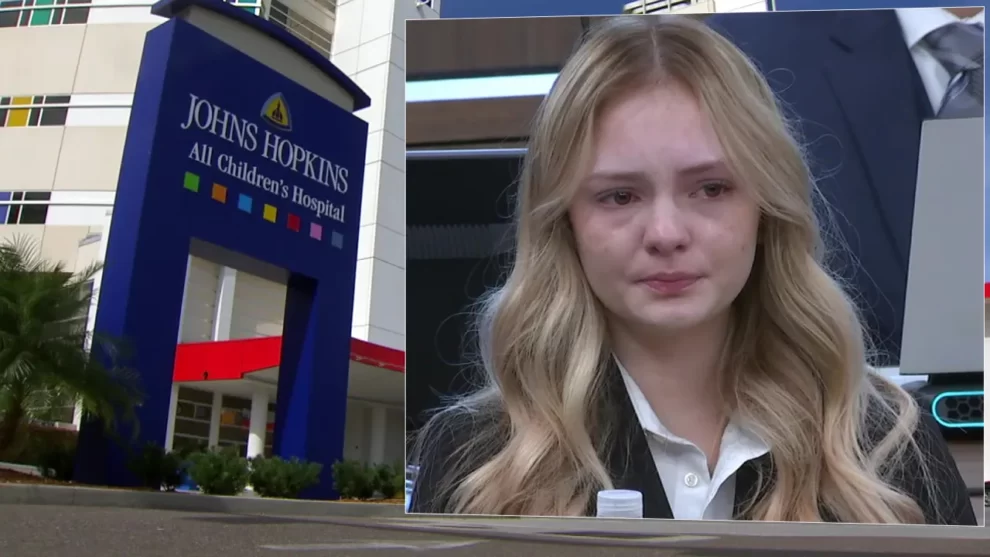Jurors in the ‘Take Care of Maya’ trial continue to hear from defense witnesses on Wednesday in a $220 million case against Johns Hopkins All Childrens Hospital.
Lisa Rek was the first to take the stand on Wednesday morning. She is a registered nurse who was at Johns Hopkins All Children’s Hospital while Maya was at the facility.
She testified that Maya had a specific morning routine which consisted of waking up, going to the bathroom, brushing her hair, and picking out an outfit for the day.
Rek said Maya was extremely modest, so the nurse would place the clothes close to Maya, close the blinds and the nurse in the room would hold up a blanket to give her privacy while she dressed herself.
Rek explained to the jury that Maya was at a heightened risk for falls after she fell while using the restroom. That’s why, according to Rek, Maya’s bathroom door and door to her room had to be open a crack while she was in the restroom.
Rek stated she believed Maya appreciated the nurses who treated her, and Maya even nominated a nurse for a Daisy Award. Rek was also nominated for a Daisy Award by a co-worker during Maya’s hospitalization.
Rek said took Maya’s laundry home twice, washed it and brought it back to the hospital. She said she washed Maya’s clothes, so she would be able to wear her own clothes instead of a hospital gown. However, Rek admitted she did not ask permission from Maya’s parents to take home her clothes for washing.
Rek noted that Maya was a beautiful, smart little girl who was a good patient.
Mark Anderson, who held several executive leadership positions at healthcare facilities, and was the chief operating officer for a children’s hospital in Wisconsin, also testified on Wednesday.
He explained how a multidisciplinary children’s hospitals work, the organizations that hold the facilities accountable and the process of employee performance reviews.
Specifically, Anderson was asked about performance reviews of social worker Catherine Bedy.
Bedy was the social worker assigned to Maya and the Kowalski family dropped its case against her shortly before the trial began.
A video recorded deposition of Bedy was played for the jury several weeks ago while the plaintiffs were presenting their case.
She began her deposition by explaining how she was written up by the hospital after yelling at a co-worker after an attorney asked her if she had ever been disciplined at work.
On Wednesday, Anderson told jurors that Bedy was reviewed positively by her peers, but noted she was given an oral warning after a verbal argument with a colleague.
During cross-examination, the Kowalski’s attorney noted that social worker Catherine Bedy had been counseled several times about her interactions with co-workers.
She was documented as saying, “Do you want to take this outside?”
Anderson stated that Bedy appeared to receive counseling on her behavior based on Human Resources records he reviewed
He added that he didn’t see anything that would prohibit Bedy from being assigned to Maya.
Dr. Elliot Krane, professor emeritus of anesthesiology from the Stanford University School of Medicine, who helped launch the pediatric pain center at Stanford University and treated lots of children with CRPS took the stand on Tuesday.
Dr. Krane testified that though he never treated Maya, he did review her medical records and does not believe she suffered from CRPS.
He also told the jury that he believed Maya had become dependent on ketamine and had developed a tolerance to the painkiller, which was prescribed by St. Petersburg physician Anthony Kirkpatrick to treat her CRPS.
“They can’t wait to get their next dosage of ketamine, they’re anxious, sometimes begging for ketamine. They feel pain, because it’s all the opposite of what ketamine does,” Dr. Krane said.
Medical staff at Johns Hopkins All Children’s Hospital told jurors that Maya was swearing at them and demanding sedatives when she was brought to the facility in October 2016 for what she described as a flare up from CRPS. Dr. Krane stated that he believes the abdominal pain that led Maya’s parents to bring her to the hospital in 2016 was caused by ketamine.
“They can’t wait to get their next dosage of ketamine, they’re anxious, sometimes begging for ketamine. They feel pain, because it’s all the opposite of what ketamine does,” Dr. Krane said.
Medical staff at Johns Hopkins All Children’s Hospital told jurors that Maya was swearing at them and demanding sedatives when she was brought to the facility in October 2016 for what she described as a flare up from CRPS. Dr. Krane stated that he believes the abdominal pain that led Maya’s parents to bring her to the hospital in 2016 was caused by ketamine.
She explained that the ketamine treatment worked, and she was improving until October 2016, when she says she experienced a flare up of pain.
However, Dr. Krane stated that Maya was receiving 10 times the amount of ketamine for someone her size and she should have been receiving physical, occupational and psychological therapy for the pain she said she was experiencing.
Dr. Krane wasn’t the only physician surprised by the amount of ketamine Maya was taking.
“I was quite surprised and shocked at the amount of ketamine that was reported, “stated Dr. Richard Andrew Elliot, an anesthesiologist at Johns Hopkins All Children’s Hospital. “They were way higher than any doses I had ever seen given to a child.”
Why was Maya kept at the hospital?
Dr. Krane told jurors that Maya did receive a lower dose of ketamine while at Johns Hopkins All Children’s Hospital to prevent withdrawal symptoms and slowly wean her off the drug.
However, Maya’s mother, Beata Kowalski, wanted her daughter to have more ketamine. She kept demanding the painkiller be given to her daughter and her persistence led hospital staff to contact the child abuse hotline.
A judge ordered Maya to be sheltered at the hospital, under state custody, while the child abuse allegations were investigated. She wasn’t allowed to be discharged to her family or another treatment facility and could not see her mother. Beata Kowalski died by suicide after being kept away from her daughter for 87 days. The Kowalskis say Johns Hopkins All Children’s Hospital medically kidnapped Maya and battered her while in their care.
Now, the Kowalski family is suing Johns Hopkins All Children’s Hospital for $220 million, claiming its actions drove Beata Kowalski to suicide.
The defense, with its witnesses, is trying to establish that Maya did not have CRPS and should not have been given high doses of ketamine. Instead, the lawyers for Johns Hopkins All Children’s Hospital are arguing that Beata Kowalski has Munchausen by proxy, a form of abuse in which caregivers make up or induce illness in their children. Defense attorneys are arguing that the hospital and its staff was trying to protect Maya.
On Monday, doctors testified about why they were concerned about the nature of Maya’s illness and why they suspected her mother, Beata Kowalski, had Munchausen by proxy, and was making her daughter sick.
Last week, doctors and nurses from Johns Hopkins All Children’s Hospital took the stand for the defense. Critical care physician Dr. Beatriz Teppa-Sanchez described a chaotic scene when Maya and her mother, Beata Kowalski, first entered the pediatric intensive care unit.
She said Maya appeared to be in intense pain, though it was difficult to pinpoint where the pain was located. The doctor also said Maya kept demanding pain medication, which surprised her.
Dr. Teppa-Sanchez noted that Beata Kowalski said she had been very stressed and at times wanted to die and just go to heaven. The doctor added that Beata Kowalski said that when Maya was in a lot of pain, she too wanted to die and go to heaven.
Source: FOX13















